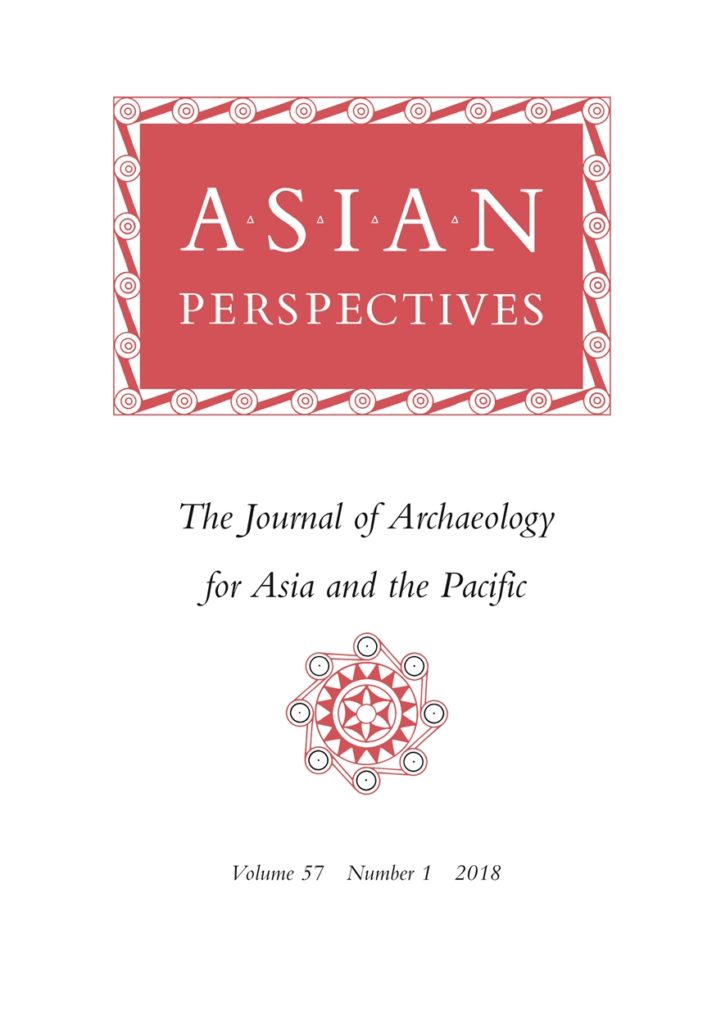 Asian Perspectives: The Journal of Archaeology for Asia and the Pacific is co-edited by Mike T. Carson and Rowan K. Flad from different parts of the globe. Carson, at the University of Guam, first joined Laura Junker (editor, 2001-2015) as co-editor to help manage a smooth transition to a new team. Flad, at Harvard University, joined Carson as co-editor for Volume 54.
Asian Perspectives: The Journal of Archaeology for Asia and the Pacific is co-edited by Mike T. Carson and Rowan K. Flad from different parts of the globe. Carson, at the University of Guam, first joined Laura Junker (editor, 2001-2015) as co-editor to help manage a smooth transition to a new team. Flad, at Harvard University, joined Carson as co-editor for Volume 54.
Flad’s expertise lies in the archaeology of China and East Asia in general, and Carson’s work focuses on Pacific Oceania and Southeast Asia. Given the journal’s vast and diverse scope, they consult on manuscripts, identify peer reviewers, and work with the editorial board through frequent email communication and monthly online video chats with assistant editor Nat Erb-Satullo of Oxford. Here they reflect on the journal’s history and future.
In his Introduction to the first issue of Asian Perspectives, dated the summer of 1957, founding editor Wilhelm Solheim wrote that the goal was “to improve communications between scholars working within the field of Far Eastern pre-history,” but that “[w]e can not at present confine ourselves to the ‘field’ of Far Eastern prehistory as it has not been established as a ‘field.’”
These decades later, what issues or questions are particularly relevant in your field?
Rowan K. Flad: We still endeavor to connect scholars working within the broader field of Far Eastern pre-history, although we are decidedly open about the geographic and chronological boundaries of relevant scholarship. We engage the interests of our broad readership by ensuring that the reviewers of each article represent varied perspectives. One challenge is ensuring that the various strains of the discipline of archaeology, from the very scientific, to the more humanistic, continue to be represented in ways that encourage dialogue.

Mike T. Carson: The journal embraces a liberal view of the archaeology of the Asia-Pacific region. When the journal was formed more than 60 years ago, the region was sorely under-represented in world archaeology and most scientific disciplines. At that time, the journal editors made an effort to accommodate perspectives beyond European and North American views of the “Far East.” The journal became known as a venue for publishing and learning about archaeological findings from many different Asian and Pacific sub-regions, emphasizing their inter-connections.
Every year, we learn more and more about the archaeology of every geographic area throughout the region. The journal maintains its role in communicating these new discoveries, now taking advantage of internet access, digital databases, and an increasingly interconnected global society of scholars. In these ways, we hope that Asian Perspectives will continue to elevate the profile of the Asia-Pacific region.
Is there an issue that you’re particularly proud of?
MC: I am equally proud of every issue of the journal in terms of its admirable quality and new information. Over the last decades, the journal occasionally has fluctuated in its production schedule, but we now have regained a steady flow of regular output. I am pleased every time we publish a new issue on schedule.
RF: We take pride in having managed to produce the journal rapidly without sacrificing the high quality of editing our readers have come to expect (due in large part to the expert technical skills of our Managing Editor, Dr. Jaida Samudra). We believe that this is because the journal is published by a university press and therefore not subject to some of the pressures that journals published by large for-profit consolidators seem to be under.
We are excited about an upcoming issue focusing on Korean archaeology that includes some real quality articles.
Where is Asian Perspectives going next?

RF: We are still revamping the style of the journal and finding ways to incorporate new directions in data production and data sharing, without sacrificing the traditional format that has always worked well for Asian Perspectives.
MC: Like any academic journal, Asian Perspectives continually must adapt to new production technologies, changing needs of our readership, and the standards of represented scientific disciplines. Lately, we have adjusted the appearance of the journal, begun including color images in the online version, and improved the functionality of the manuscript management system.
We expect to see more improvements over the next few years, especially concerning the increasing use of languages other than English in personal and place names and bibliographic references. We would be happy to learn what our readers and contributors might want to suggest for the future.
Do you have any advice for academics interested in submitting to Asian Perspectives?
MC: Prospective authors may wish to explore online information about the journal, our style guide, and examples of recently published issues. These explorations will enable prospective authors to gain a good sense of the scope of what we publish.
We encourage potential contributors to contact us in advance about the suitability of new work for the journal. Sometimes, we can suggest modifications, refinements, or expansion of the scope of new work. In some cases, we might see how a proposed article could interface with other manuscripts already in review.
RF: It is always a good idea to write to tell us what you hope to publish to see if it is a good fit for the journal. We very much appreciate thorough cover letters that explain the impact of the proposed article and its main point and audience. We particularly appreciate this if you are sending in a revision to a previous submission that has been returned with reviewer comments. Taking all reviewer comments seriously and addressing them explicitly makes it much easier to consider the revision for publication.
Learn more about Asian Perspectives, peruse journal content, and check out the journal’s online manuscript management system.




